In preparation for the next Smackdown Team Experience is traveling back to 2000.
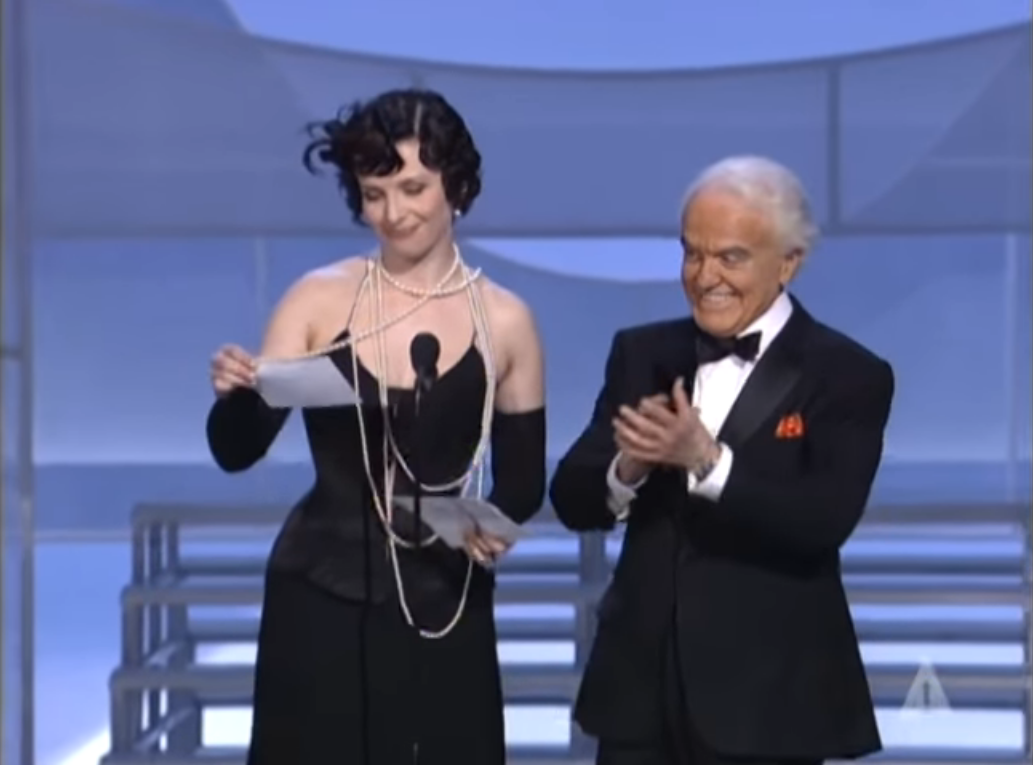
Juliette Binoche and Jack Valenti announcing Best Foreign Language Film.
Coming into the 73rd Academy Awards, the results of the Foreign Language Film category must have felt like the biggest lock of the night (this writer can only assume based on hindsight since he was only a five-year old bébé at the time). Crouching Tiger, Hidden Dragon was the perfect storm when it hit American audiences. The film came from an established filmmaker, Ang Lee, who had made several critical and commercial hits in English and otherwise, the storytelling was tailored to better suit Western sensibilities, it featured international stars known to the English-speaking film market, it received rave reviews and enormous box office returns, and it was both partially funded and widely distributed by a major American studio...
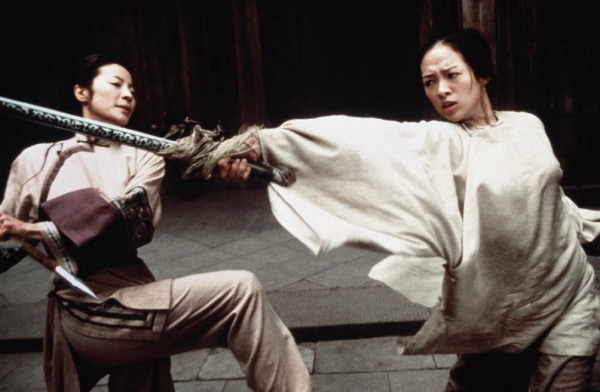
Crouching Tiger is an exciting melting pot of genres stirred together to tell a fascinating tale of love, betrayal, and battle set in ancient China. The acting is top-notch, particularly by the women - Michelle Yeoh is quietly piercing as a steely warrior in a tragic romance with a colleague while Zhang Ziyi is ferocious as a reckless bride-to-be (who should’ve definitely been a bigger contender in the Supporting Actress race - more on that race in this week’s Smackdown).
In the field of foreign nominees, Taiwan led the pack by an enormous margin. Ang Lee's beloved hit had ten Oscar nominations including Picture, Directing, and Adapted Screenplay (and won four trophies on the big night, which is still the record for a subtitled feature albeit tied with South Korea's Parasite and Sweden's Fanny & Alexander). It was Taiwan's third nomination and first win and the only Asian nominee in that year's field.
The other contenders only had that single foreign film nomination.

Crouching Tiger's toughest competition was Mexico’s Amores Perros. The triptych film, directed by Alejandro González Iñárritu (who would soon become an Oscar favourite) does not shy away from the desperation, pain and violence of its protagonists. Gritty filmmaking has long been Iñárritu’s signature as a filmmaker and this early film was no exception. Its warts and all approach may turn off viewers, but the mmersion into this particular perspective comes off as an honest observation of the more dangerous parts of human behavior, interaction, and emotion. Scenes play out with immediacy that brings its stakes to a visceral level, especially the ones involving dogs, whether it be dogfighting or a dog stuck under a floorboard. By providing connective (and sometimes overlapping) elements to these stories, the film achieves a considerable cumulative impact. The result is a harrowing experience.
The rest of the field was very disappointing.
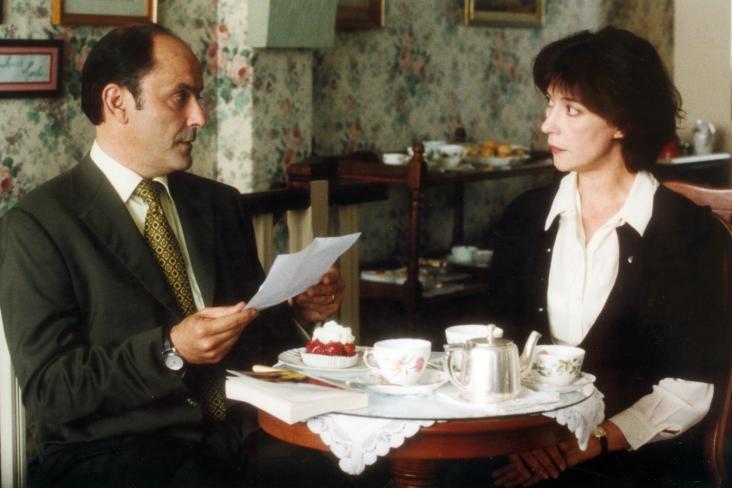
From the distressing, we move to the ighthearted. France’s The Taste of Others, directed by Agnès Jaoui, mainly focuses on a capitalist who falls in love with a theater actress. When he hires a teacher to improve his English it turns out to be the same actress! But this is just one of the several narrative strands in this film. The film follows several minor characters who are also connected. While the unifying element of the storylines is their focus on adult relationships they unfortunately share a lack of melodramatic tendencies. The filmmaking is staid, lacking any desire to go beyond the bare minimum to engage you in the narrative. Instead of presenting keen observations on romance, sex, and the mess created when multiple people become intertwined, the movie feels scattershot and aimless, but for the sensitive performances from its two leads.

Another nominee on the lighter side is Belgium’s Everybody’s Famous!, directed by Dominique Deruddere. It's a dark comedy about a fifteen-year old girl who regularly joins singing contests but never wins. This pushes her father to kidnap a famous singer so that his daughter will get the airtime and fame that she desperately wants. The problem with this film is that it is never enough of anything. The dark humor doesn't land because the film is non-committal with its tone. The more disturbing plot elements like the kidnapping and coerced sex, are not executed with nuance, turning these potential deeper elements into meaningless points of curiosity. The absurdity of the setup isn't pushed hard enough which makes the whole conceit feel half-hearted.
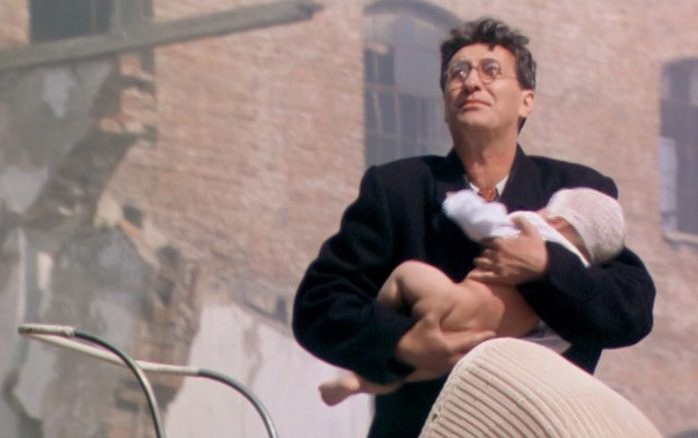
Finally, what is an Oscar Best Foreign Language Film lineup without a WWII film? That slot was filled for 2000 by Czech Republic’s Divided We Fall, directed by Jan Hřebejk. It's a dramedy about a childless couple who are hiding a Jewish man from the authorities. When the threat of their secret being exposed arises, the couple decides that the only way they can be protected is if she has a sudden “miracle” and gets pregnant. Divided We Fall walks a tightrope of competing tones, but the movie is scant on emotional context that might have given it more weight. Several moments in the film showcase dark humor established with blocking or the actors physicality (a scene which involves hiding the Jewish man under a blanket while the woman pretends to be bedridden comes to mind). Though individual scenes work, they dont always feel organic or motivated. It's all more exciting on paper than in the execution.
For a category that is very resistant to Asian cinema, I am glad the Academy was able to let go of their pre-existing bias, even if only for a moment, to reward Crouching Tiger which was the deserved runaway winner.
However, if we were expanding our shoulda-won conversation to the other submissions for 2000, I will easily choose another Asian film as the winner over Ang Lee’s masterful work.
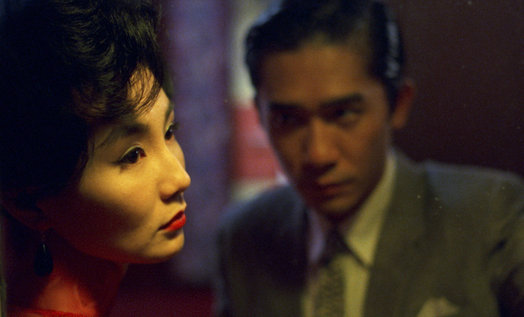
Hong Kong’s In the Mood for Love is a masterfully crafted piece from Wong Kar-wai. It's a manifestation of his cinematic genius in every scene, shot, and cut. Two married neighbors come to realize that their spouses are having an affair, and they form their own bond that is strong and powerful. Wong’s directorial achievement is for the ages, maximizing the potential of its lean narrative to create something that transcends words and plot intricacies. Instead, the film lives and breathes in the silences between the words as missed opportunities flash before our eyes. With two beautifully aching performances from screen legends Tony Leung Chiu-Wai and Maggie Cheung, reverberating sounds, and hypnotic images, the film is potent in every aspect, earning its legacy as one of the greatest love stories put to film.
At the Oscars everything was pointing to an easy victory for Crouching Tiger, Hidden Dragon and deservedly so, especially given the roster of nominees. However, the lack of nomination for In the Mood for Love that year is a manifestation of a long-existing bias against Asian cinema that permeates the Oscars to this day. Rarely do we see Asian nominees represented in the-now renamed "International Feature Film" category. Even rarer is the chance to see two compete. (Only once in history were three Asian films nominated in a single year.)
I am happy for all the success that Crouching Tiger, Hidden Dragon had during its awards run, but shouldn’t we be able to celebrate more than one Asian film at a time instead of annual handing uninspired nominations to the usual European suspects?